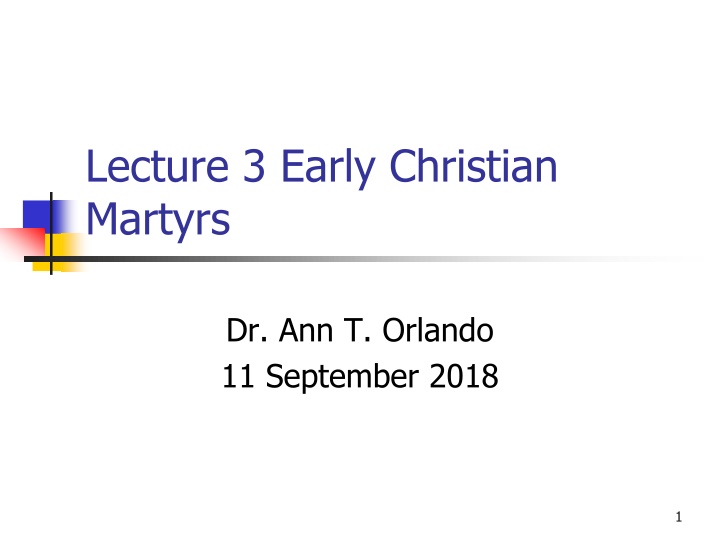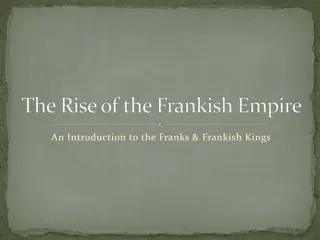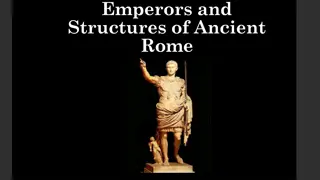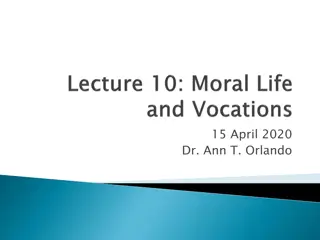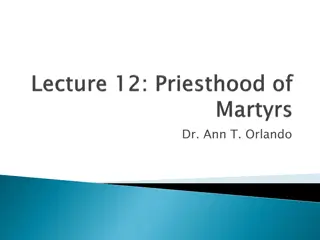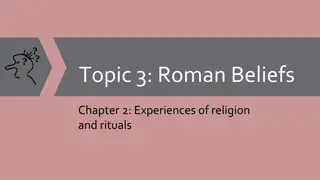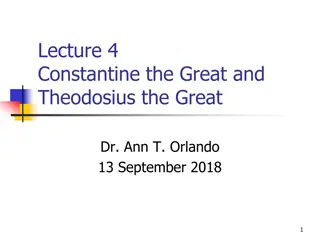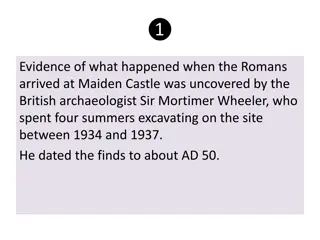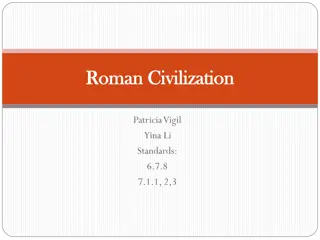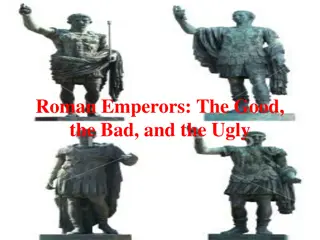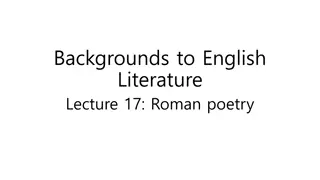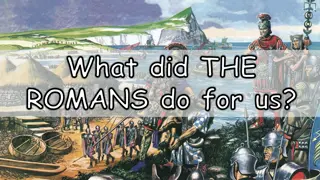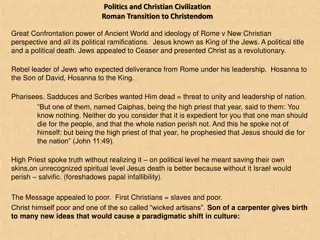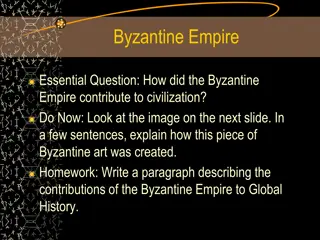Overview of Early Christian Martyrs in the Roman Empire
Explore the historical context of early Christian martyrs in the Roman Empire, starting from the first century with the reign of Augustus to the turmoil and persecutions in the third century under emperors like Diocletian. Learn about the Roman religion, the Five Good Emperors, and the social dynamics that shaped the rise of martyrdom among Christians.
Download Presentation

Please find below an Image/Link to download the presentation.
The content on the website is provided AS IS for your information and personal use only. It may not be sold, licensed, or shared on other websites without obtaining consent from the author.If you encounter any issues during the download, it is possible that the publisher has removed the file from their server.
You are allowed to download the files provided on this website for personal or commercial use, subject to the condition that they are used lawfully. All files are the property of their respective owners.
The content on the website is provided AS IS for your information and personal use only. It may not be sold, licensed, or shared on other websites without obtaining consent from the author.
E N D
Presentation Transcript
Lecture 3 Early Christian Martyrs Dr. Ann T. Orlando 11 September 2018 1
Outline Review of Roman History Roman religion Roman persecution Martyrs 2
First Century Roman Empire after Augustus Series of relatives of Augustus become Emperor, ending with Nero, murdered 68 AD (Claudio-Julian line) Succeeded by Vespasian, general in Judea Vespasian, Titus, Domitian known as the Flavians Coliseum built by Vespasian 3
Second Century, Five Good Emperors After Domitian, Nerva and then Trajan, 98-117 Hadrian, 117-138 Antonius Pius, 138-161 Marcus Aurelius, 161-180 Policy of adopting a suitable successor, not relying on a relative Policy of appointing excellent administrators for provinces (Pliny the Younger in Asia Minor) The Empire was peaceful and prosperous www.edupic.net/Images/SocialStudie s/trajan's_column01.jpg 4
Roman Provinces www.unrv.com/roman-empire-map.php Roman Empire Map 5
Third Century, Turmoil and Famine Marcus Aurelius s son, Commodus (180-192), was vicious, paranoid Strangled in his bath, then stabbed; end of Antonnines After a period of civil war, Septimus Severus (193-211) becomes Emperor War against Persians Revamped Roman military and law Died in York, England; succeeded by sons Caracalla (211 217) and Geta Series of Severides and other generals of brief reign throughout Third Century Decius (249-251), major Christian persecution Attempt to re-unify Empire with renewed adherence to ancient religion Made people buy a libellus to prove they had sacrificed to gods Diocletian 284-305 Greatest persecution of Christians 6
Roman Religion Roman religion was a public, civic obligation; NOT primarily a way to have a personal relationship with Divine Anyone who did not offer public sacrifice for the good of the state was considered an atheist Impiety was a sin against both gods and the family Nero started Cult of Roman Emperor as god in his lifetime But Nero and Domitian are only two emperors Roman Senate did not deify Rome links its gods with Greek gods through Virgil s Aeneid mystery religions became very popular in 1st through 3rd Century Roman society (Cults of Mithra; Isis and Osiris; Dionysius) Romans very tolerant of other beliefs A wealthy paterfamilia would sometimes set aside space for slaves and clients for their own mystery cults San Clemente 7
Roman Family Roman household was composed of paterfamilia (father) and clients (wife, children, slaves, business associates dependent upon him) Father had complete control of clients until he died Adoption, including adult adoption, was common among wealthy families All sons treated equally as heirs (no primogeniture) Exposure of unwanted infants, at discretion of father Duty (fortitude) to family and state was one of the most important Roman virtues Family was a state within a state 8
Roman Games Romans loved blood sports Gladiators were sports stars of the Roman world Important part of criminal and slave trade was supporting circuses Typical day at the Coliseum (60,000 spectators; note Circus Maximus held 250,000) Morning: animal fights Lunch: execution of criminals Afternoon: gladiators wwwdelivery.superstock.com/WI/223/ 1397/PreviewComp/SuperStock_1397R -33003.jpg 9
Christian Responses to Persecution 1. Intellectual: Apologies written to justify Christianity to Roman authorities 2. Facing torture and death without apostasy; often even looking forward to martyrdom eagerly as a proof of solidarity with Jesus 3. But, if you believed that Jesus only appeared to be human (docetists), then there seemed little reason to be a martyr yourself 4. Some did not have the courage when accused, and so apostatized and/or paid others for their libelli 10
Martyrs Real desire to prove the totality of Christian faith (e.g., Origen On Martyrdom) Those who died were (still are) considered heroes of the faith Pilgrimage to place of burial Remembering their sacrifice in Acts ; Peter (Quo vadis); Polycarp; Perpetua and Felicity; Justin Martyr Those who suffered but did not die (also known as confessors) were popularly considered able to forgive sin of apostasy Problem for 3rd C bishops 11
1. Response to Persecution: Apologies Type of literature that often had the form of a legal defense It was intended for a highly educated pagan (i.e., philosophical) audience; often drew heavily on philosophical concepts to explain Christianity Tried to establish antiquity and respectability of Christianity It tried to show that Christianity was not to be feared, but encouraged good citizenship St. Justin Martyr wrote two Apologies; Tertullian wrote an Apology 12
2. Response to Persecution: Martyrdom and Christianity Martyr comes from Greek word for witness Did not actually have to die to be a martyr, but to suffer for faith (slavery, prison, mines) Note: Romans tried to avoid creating Christian martyrs; accused were given several opportunities to offer sacrifice In 3rd Century, Roman authorities started issuing a receipt, or libellus to those who sacrificed; authorities also attacking Christianity as such, destroying Scripture 13
3. Response to Persecution: Docetists (Gnostics) Heavily influenced by Platonism Believed that Jesus was God, and therefore could not suffer Physical was not important; one should try to rise above the physical to the spiritual Martyrdom had little value Knowledge (gnosis) of faith was a secret revealed by God to individual, not taught and open to all Docetists were bitterly fought by orthodox Christians, especially bishops 14
4. Christian Response to Persecution: Apostates (or Lapsed) Very often, after persecution subsided, apostates wanted to return to Church Some sought forgiveness from martyrs Some Churches refused to allow them to return; Church only for pure: Donatists Some wanted them to be rebaptized Church needed a uniform policy Papacy guided the Church through several controversies, always on the side of forgiveness 15
Controversies About Martyrs Within Church Martyrs in life and death were considered heroes of the Church with great personal spiritual power Martyrs as the ultimate followers of Christ Popularly believed that they could forgive sins, especially the sin of apostasy What is relation of bishops and martyrs for authority in Church? What of bishops who apostaze? What is the validity of their baptisms? Should the Church encourage martyrdom? Official stance by most bishops was not to actively seek it, but if pushed, not to deny the faith Tertullian, North African Christianity 16
Voluntary Martyrdom Bishops actively discouraged Christians from volunteering as martyrs If accused, then Christians should not renounce the faith, but should not flaunt it for purpose of being martyred This would be suicide, not in accordance with God s will Neither should Christians take up arms to defend themselves There is no recorded instance of any Christian rising in armed rebellion against the Romans In distinction to earlier Judaism or later Islam See, for example, Clement of Alexandria, Stromata IV.10 17
Bishops and Martyrs Who has authority: bishops, not martyrs; so Cyprian Only bishops can forgive sins and re-admit apostates to communion in Church Martyrs should not be called heroes (see Letter 27) Apostate bishops Led to Donatist controversy Worth of minister does not determine validity of sacrament (so Augustine) 18
Earliest Christian Hymn Earliest known hymn not found in New Testament is (Phos Hilaron, or Joyful Light) Documented in Apostolic Constitutions (c. 310) By tradition, written by bishop and martyr St. Athenogenes According to Roman Martyrology, he composed the hymn as he was being led to martyrdom by fire c. 305 Athenogenes and 10 Companions Feast Day July 16 19
Catacomb Fresco of Martyrs in Fire From St. Priscilla catacomb, outside Rome C. 305 20
Issues Surrounding Canon of Christian Scripture The OT (Septuagint): in or out? Relation of creator God to Father of Jesus Christ How can there be suffering if the creator God is a good God? (theodicy problem) Is God anthropomorphic; as OT might indicate? Relation to Judaism What is in NT? Paul primary or Gospels What literature about Jesus is sacred What writings of early believers is in/out (e.g., First Letter of Clement, Epistle of Barnabas, Shepherd of Hermes) Answers to these questions determined which books considered authoritative by various Christian groups In this era many Christian groups selected books to support their theology; Canon is from Greek word for rule or measure 21
Establishment of the Christian Canon By early 4th Century, most orthodox Christians accepted canon of Scripture Septuagint basis for OT NT as we currently have it But how to interpret what is there Literal (historical, moral??) Allegorical (philosophical??) Both the canon and its interpretation will be revisited during the Reformation 22
The Latin Bible (Vulgate) Pope Damasus (d. 384) asked Jerome to provide a unified Latin (Vulgate from vulgar) translation For two centuries non-Greek speaking Christians had used the Old Latin Bible Pope Damasus also encouraged translation of liturgy to Latin for Western use Jerome spent years and travelled widely to analyze the best texts Studied in Origen s library in Caesarea Bethlehem home base for Jerome Controversy between Jerome and Augustine over correct text of Old Testament: LXX or Hebrew Jerome used a combination Reasons Augustine wanted LXX as basis for Old Testament Maintain Church unity with the East LXX used in New Testament 23
Assignments CoG I.35, V.16, VIII.27, XXII.9-10 CoG X.25, XVIII.41-44, XX.28 Hitchcock, Ch. 2 and 4 24
